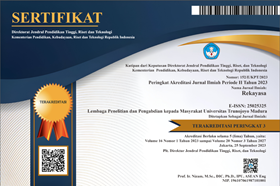Kepuasan Kerja Karyawan di Rumah Sakit : Review Masalah dan Prospek di Era Digital
Abstract
Measuring employee job satisfaction in hospitals in the digital era shows that digital technologies, such as online survey platforms, mobile applications, and data analytics, have increased the efficiency of data collection and analysis. These technologies enable faster, more accurate, and more personalized job satisfaction assessments, helping management better understand employee conditions and respond to their needs effectively. However, major challenges arise related to employee data privacy, limited digital infrastructure in certain hospitals, and resistance from some employees who are less familiar with digital technology. These factors can affect the quality of the data obtained and employee trust in digital-based assessment systems. Recommendations for hospital management include developing flexible assessment systems, investing in digital training for employees, and ensuring data security and transparency in its use to build trust. These steps can help improve overall job satisfaction and retain quality healthcare workers amidst the challenges of the digital era.
Keywords
Full Text:
PDF (Bahasa Indonesia)References
Alshmemri, M., Shahwan-Akl, L., & Maude, P. (2017). Herzberg’s two-factor theory. Life Science Journal, 14(5), 12–16.
Appleby, C., Henricks, J., Wurz, J., Shades, C., Shukula, M., & Chang, C. (2021). DI_CHS-digital-IT-scottsdale-institute. In Deloitte Insights (pp. 1–17).
Bail, K., Davey, R., Currie, M., Gibson, J., Merrick, E., & Redley, B. (2020). Implementation pilot of a novel electronic bedside nursing chart: a mixed-methods case study. Australian Health Review, 44(5), 672–676.
Benlian, A. (2022). Sprint zeal or sprint fatigue? The benefits and burdens of agile ISD practices use for developer well-being. Information Systems Research, 33(2), 557–578.
Bettaieb, O., Chahdoura, H., Abdallah, H. H., Bouguerra, F., Bouzid, N., Belajouza, S. K., & Tebra, S. (2023). 21P Medullary carcinoma of the breast: About 18 cases. ESMO Open, 8(1).
Chilukuri, B. S., & Kuiken, S. Van. (2017). By taking a comprehensive approach to digitization, healthcare companies can deliver products and services more quickly, boost innovation in the industry, and hold down costs. 1–14.
Clara, S., Healthcare, G. E., Company, G., Award, Y., Healthcare, G. E., Healthcare, G. E., Healthcare-, G. E., Shah, S., Manager, P., Healthcare, G. E., Healthcare, G. E., Intelligence, E., Phadnis, A., Officer, C. D., Healthcare, G. E., & Healthcare, G. E. (2021). GE Healthcare Named “ 2020 Global Company of the Year ” by Frost & Sullivan for its AI-based Command Centers that Help Hospitals Make Real-time Decisions That Improve Care Delivery. 2–5.
Covid-, T. (n.d.). Digital transformation. Figure 1, 1–13.
Eastburn, J., Fowkes, J., Kellner, K., & Swanson, B. (2024). Digital transformation: Health systems’ investment priorities. June, 1–8.
Evans, B. (2022). Benefits of Digital Transformation in Healthcare. Journal of Health Care Communications, 7(2), 1. https://www.primescholars.com/heavy-metal-toxicity-diseases.html
Eve, M. P., Neylon, C., O’Donnell, D. P., Moore, S., Gadie, R., Odeniyi, V., & Parvin, S. (2021). Reading peer review: PLOS ONE and institutional change in academia. Cambridge University Press.
Fadel, M. A., Elfallah, E. A. O., & Elghriani, A. (2020). An evaluation of the attitudes of healthcare nurses towards new technologies. Proceedings of the 6th International Conference on Engineering & MIS 2020, 1–6.
Gareth, J., Zinaida, P., Kristin-Anne, R., & Adam, S. (2019). Promoting an overdue digital-transformation in healthcare. McKinsey Insights, June. https://www.mckinsey.com/~/media/mckinsey/industries/healthcare systems and services/our insights/promoting an overdue digital transformation in healthcare/promoting-an-overdue-digital-transformation-in-healthcare.pdf?shouldIndex=false
Inescapable, T., & Transformation, D. (2022). Do Digital Health Right with Test Automation The Sky-High Stakes Test Automation’s Supporting Role in Digital Health. 22–24.
Isik, L., Nilsson, C., Magnusson, J., & Koutsikouri, D. (2024). Benefits realization in digital transformation: the translation from policy to practice in health care. Transforming Government: People, Process and Policy, 18(2), 303–317.
Jebb, A. T., Ng, V., & Tay, L. (2021). A review of key Likert scale development advances: 1995–2019. Frontiers in Psychology, 12, 637547.
Johnson, J. (2024). “Employee Engagement in the Digital Age: Exploring the Influence of Technology on Job Satisfaction.” International Journal of Creative Research Thoughts, 12(4), 2320–2882. www.ijcrt.org
Leenen, J. P. L., Dijkman, E. M., van Dijk, J. D., van Westreenen, H. L., Kalkman, C., Schoonhoven, L., & Patijn, G. A. (2021). Feasibility of continuous monitoring of vital signs in surgical patients on a general ward: an observational cohort study. BMJ Open, 11(2), e042735.
Lilja, J. (2020). Digitalisation and Well-Being At Work. April.
Lunenburg, F. C. (2011). Expectancy theory of motivation. International Journal of MBA, 15(1), 43–48.
Medical, V. (2022). Vyne Medical to Attend 7th Annual Becker’s Health IT + Digital Health + RCM Annual Meeting. 1–2.
Mukherjee, D., & Gopal, N. (2024). Impact of digital transformation on employee job satisfaction- a bibliometric analysis. International Journal of Bibliometrics in Business and Management, 3(2), 95–146.
Ngugi, P. N., Were, M. C., & Babic, A. (2021). Users’ perception on factors contributing to electronic medical records systems use: a focus group discussion study in healthcare facilities setting in Kenya. BMC Medical Informatics and Decision Making, 21, 1–14.
Ozdoba, P., Dziurka, M., Pilewska-Kozak, A., & Dobrowolska, B. (2022). Hospital Ethical Climate and Job Satisfaction among Nurses: A Scoping Review. International Journal of Environmental Research and Public Health, 19(8). https://doi.org/10.3390/ijerph19084554
Rai, R., Thekkekara, J. V., & Kanhare, R. (2021). Herzberg’s two factor theory: A study on nurses’s motivation. RGUHS Journal of Allied Health Sciences, 1(1).
Santana, S., & Pérez-Rico, C. (2023). Dynamics of organizational climate and job satisfaction in healthcare service practice and research: a protocol for a systematic review. Frontiers in Psychology, 14. https://doi.org/10.3389/fpsyg.2023.1186567
Seibert, K., Domhoff, D., Huter, K., Krick, T., Rothgang, H., & Wolf-Ostermann, K. (2020). Application of digital technologies in nursing practice: Results of a mixed methods study on nurses’ experiences, needs and perspectives. Zeitschrift Für Evidenz, Fortbildung Und Qualität Im Gesundheitswesen, 158, 94–106.
States, U. (2022). PRESS RELEASES GE Healthcare Developing a Digital Health Platform to Help Providers Accelerate Digital Transformation. 1–6.
Sun, P., Wang, M., Song, T., Wu, Y., Luo, J., Chen, L., & Yan, L. (2021). The psychological impact of COVID-19 pandemic on health care workers: a systematic review and meta-analysis. Frontiers in Psychology, 12, 626547.
Suretest, B. (2022). Overcoming Staff Burnout along the Digital Transformation Journey The Dawn of Digital Transformation 3 Ways HealthTech Innovation Supports Employee. 3–5.
We, W., We, W. H. O., & Ts, P. (n.d.-a). Digital Front Door Solutions Driving Healthcare. 22–24.
We, W., We, W. H. O., & Ts, P. (n.d.-b). Digital Transformation : 5 Technology Imperatives to Becoming a Data-Driven Organization. 1–5.
DOI
https://doi.org/10.21107/rekayasa.v17i3.27912Metrics
Refbacks
- There are currently no refbacks.
Copyright (c) 2024 Sukmo Hadi Nugroho

This work is licensed under a Creative Commons Attribution-ShareAlike 4.0 International License.
























